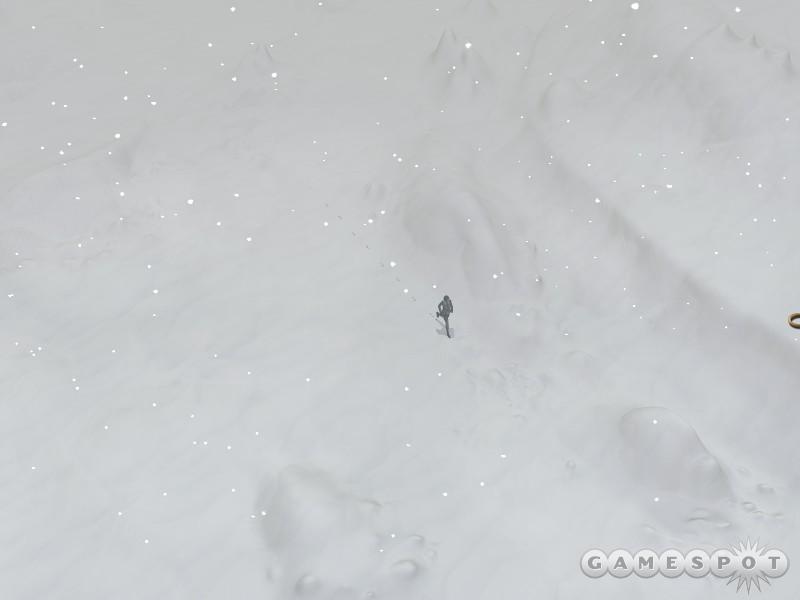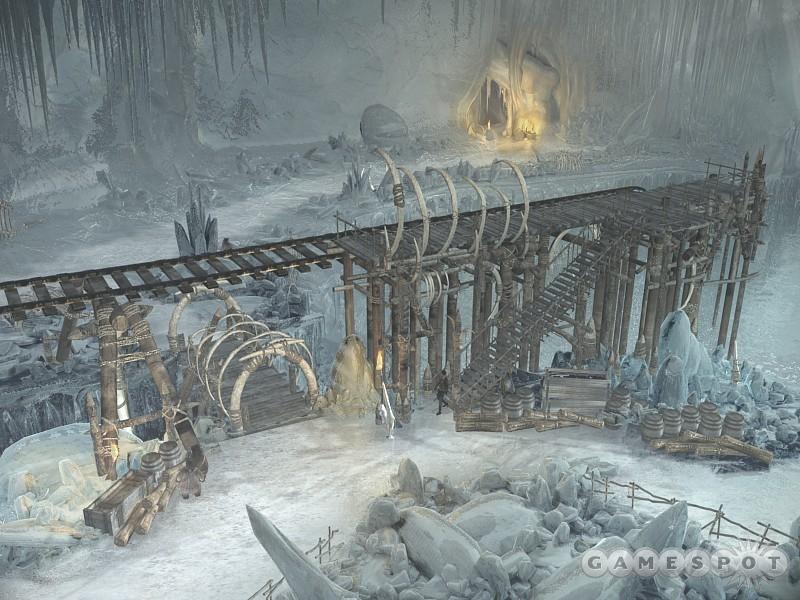Syberia was a magical game that got just about everything right. Above all, it captured a real spirit of adventure that many adventure games ironically lack. The game's richly imagined, visually stunning world created a real sense of wonder and exploration. The puzzles were mostly interesting and reasonable, tying in to the gameworld smoothly and naturally. Syberia also featured an unusually well-rounded, strong heroine, Kate Walker. She began the story as a New York attorney sent to a small European town to close a business deal. By the end of the game, she had made the decision of a lifetime: to leave her promising career and thorny personal life behind to help a strange old man, Hans Voralberg, pursue his lifelong dream of finding a lost land of living mammoths. In Syberia II, you lead Kate on her further adventures with Hans toward the legendary realm of Syberia, hidden somewhere in the distant East. While this sequel doesn't quite capture the ineffable magic of the original game, it's still a strong follow-up that easily surpasses many recent adventures.

In Syberia II, you continue your journey into the unknown aboard Hans' streamlined clockwork train, with the timid and sometimes peevish automaton, Oscar, again at the controls. The game opens in the run-down Russian town of Romansburg, a tiny little frontier outpost overlooked by an imposing old monastery on a nearby mountaintop. From there, you head into the snowy Russian wilderness where you'll encounter some ferocious wildlife and an old friend from the first game who makes a dramatic entrance. Your travels eventually take you to a remote cave complex that houses a village of vaguely Eskimo-like people known as the Youkol. Eventually, you'll help the ailing Hans travel into the great unknown to see if you can reach the fabled land of Syberia at last.
Other than some second-act tedium, Syberia II is fairly well paced, with an ever-greater sense of expectancy as you near your final goal. Then again, the journey as a whole isn't as enticing this time around. The first game let you travel on an exciting journey while also unraveling an intriguing, emotionally captivating mystery. Here you're only doing more traveling on the same train, with the same characters, hoping for some big payoff at the end. All along the way you'll have to coddle Oscar, who again hides in the train, worries, or complains most of the time, as well as Hans, who is subject to delusional fits and manages to get himself in serious trouble repeatedly. Plus, the game does little to make the idea of reaching Syberia enticing in and of itself, beyond its symbolic value as a land of childhood dreams made manifest. Unless you're a particularly big fan of mammoths, the whole notion is likely to leave you unmoved.

Lack of emotional resonance hurts the story in a number of ways, actually. There are indeed a couple of moments that tug at the heartstrings. One of them is strikingly powerful because it's so unexpected and strange and yet so fitting and melancholy. For the most part, though, the story just isn't as well fleshed out as that of the original game. There's a thematically relevant but boring subplot told exclusively through cutscenes, showing how Kate's old law firm sends a detective after her to reel her back in. These scenes--basically just voice-overs of phone conversations--aren't interesting and are also jarring in their occasional use of profanity, which seems totally out of place in the gentle, wistful atmosphere of the Syberia games. Imagine someone suddenly cussing in the middle of an animated Disney film. There's also a weak in-game subplot with two silly and unbelievable villains, Igor and Ivan, one an outrageously slow simpleton, the other a cardboard cutout of a cackling bad guy. More importantly, the ending, while heartfelt, feels too abrupt, leaving too many unanswered questions.
Also, Kate is something of an enigma this time around. Her only motivation seems to be helping the diminutive, feeble Hans live out his childhood dream of seeing real live mammoths. What exactly is her reason for ditching her family, friends, and career to help him? She doesn't seem close to the enigmatic man on a personal level and certainly shows no great interest in Syberia itself, so you're left to guess. You can only speculate that she clings so tenaciously to Hans' dream because she made a total break with her old life before she had any dreams of her own to pursue.

While Syberia II's story isn't all it could be, it still gets the job done reasonably well. It even manages the neat trick of introducing child and animal characters and making them, against all odds, cute and sympathetic instead of cheesy and saccharine. Of course, Syberia II is about more than its story: You'll solve plenty of puzzles during your adventures. Like in the original Syberia, they usually tie in to the gameworld well, without the sort of arbitrariness that mars lesser adventures. Overall, they're fairly easy--just challenging enough to be interesting and offer a little sense of accomplishment. They run the gamut from a prosaic bit of salmon fishing to finally letting you operate the wondrous train that's played so big a role in the games.
While most of the puzzles should seem pretty easy to adventure game veterans, there are a few harder ones this time around, too. Some are hard in the welcome way of really forcing you to think. Some are hard, though, because they force you to engage in too much monotonous trial and error, random button pushing, or traipsing back and forth. Some puzzles are hard simply because it's easy to overlook certain small items that blend too readily into the backgrounds. It's nice to see a slightly greater range of difficulty this time around but sad to see this sort of inelegance marring such an elegant series.
Whatever you think of the puzzles and story, you're likely to be impressed with Syberia II's gorgeous visuals. The cutscenes are a model of their kind, filled with cinematic drama and marvelously rich detail. The in-game graphics boast equally meticulous and imaginative details, interesting camera angles, and dramatic lighting. It's enjoyable to simply let the eye dwell on the plush, old-world luxury of the train interior or the massive Youkol machinery built of mammoth bone, petrified wood, and leather. You'll also see more background animations this time around, whether people going about their business, birds flitting past, or snow sliding off a roof.
It does get tiring, though, to see one snowy mountain path or icy cavern after another without any respite. It's too bad the gifted artists behind the game were shackled by the story's wintry locales, quite unlike the exotic variety of the first game. The foreground animations aren't all they could be, either, with too many stiff, unconvincing gestures from many of the characters.
The audio suffers from its problems, too, mainly with the voice-overs. Most of the main characters are voiced well enough to make them seem plausible and likeable, if a bit wooden at times. Fans of the first game will likely be happy to hear familiar actors reprising their roles. Some voice-overs just don't cut it, though. The isolated, mysterious Youkols seem to speak a language of just four or five native words mixed with giggles and, quite improbably, broken English and no consistent accent. Worse still is the villain Ivan, with his British accent and hokey "diabolical villain's laugh" that sounds badly forced.

On the bright side, admirably subtle ambient sounds of wind and birds and shifting ice all draw you into the game's locales. The musical score fits the action perfectly: Its melodies aren't particularly memorable, but they feature well-chosen instrumentation, ranging from flutes and celestas and gentle strings to accompany Kate and Hans' journeying, to a mix of ominous drums, rasping Tibetan-style brass, and chants for the Youkol village.
Syberia II is filled with attractive, memorable touches like that. At the same time, it's a bit of a letdown compared to the superlative first game: The story is solid but not as engaging, some puzzles could have used reworking, the locales suffer from a certain monotony or even blandness at times, and the game as a whole feels a bit shorter, too. While Syberia II only sometimes captures the elusive magic of the original game, it's still one of the finer adventure games to come out in the last couple of years. Its production values alone put it well above most of its peers. While Syberia II isn't all that fans might have hoped for, it's still a very fine game and likely to provide you with hours of enjoyment.